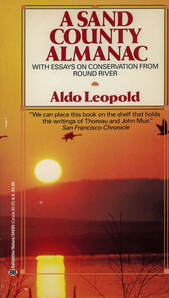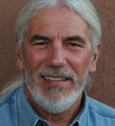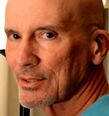We stood by and allowed what happened to the Great Plains a century ago, the destruction of one of the ecological wonders of the world. In modern America, we need to see this with clear eyes, and soberly, so that we understand well that the flyover country of our own time derives much of its forgettability from being a slate wiped almost clean of its original figures. |
|
0 Comments
My Book World Leopold, Aldo. A Sand County Almanac and Sketches Here and There. With illustrations by Charles W. Schwartz. London: Oxford, 1949. I came across this tome while letting a house in the hill country of Texas, a place where the landowners raise native grass and wildflower seeds for wide distribution and sales, also a place where owners protect the environment and earnestly promote its care. The author, born in the late 1880s, is around sixty when he writes this book about ecology. At that time he already sees the Earth’s demise headed our way, now seventy years ago. And people wonder why we should be on fire about the current state of world environment? Since the age of early industrialization, humankind has been killing off the world, one species of botany and zoology at a time. And we’re still at it: cars and jets, fracking, coal. Land, sea, and air ruined daily one molecule at a time, even if the sun is shining, even if, in the middle of an ocean, you see nothing but blue (you haven’t yet spotted the great vortex of plastic bottles). The decay, the earth’s demise is there, rolling in slow motion. And Leopold sees this. Seventy years ago! Leopold expresses his deep love for Nature with a lengthy history of a good oak taking seed in 1865. Metaphorically, he cuts it down, and, by surveying its eighty rings, can tell the reader what traumas the local ecology has experienced: “Now we cut 1910, when a great university president published a book on conservation, a great sawfly epidemic killed millions of tamaracks, a great drouth burned the pineries, and a great dredge drained Horicon Marsh. I cannot go on, but the author continues, year by year, until the fallen oak has revealed all that the land has enjoyed or endured, usually at the hand of human beings, politicians who have little understanding nor care for the environment: “The congressmen who voted money to clear the ranges of bears were the sons of pioneers. They acclaimed the superior virtues of the frontiersman, but they strove with might and main to make an end of the frontier” (137). Leopold reveals bitter irony after irony, desecration after desecration of our native earth, and, again I say, seventy years ago! And still, we (as a species) do not listen.
NEXT TIME: My Journey of States-50 Oregon |
AUTHOR
Richard Jespers is a writer living in Lubbock, Texas, USA. See my profile at Author Central:
http://amazon.com/author/rjespers Archives
June 2024
Categories
All
Blogroll
Websites
|




 RSS Feed
RSS Feed